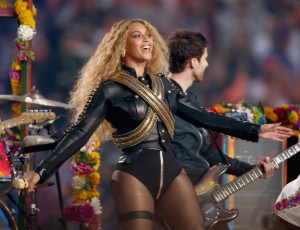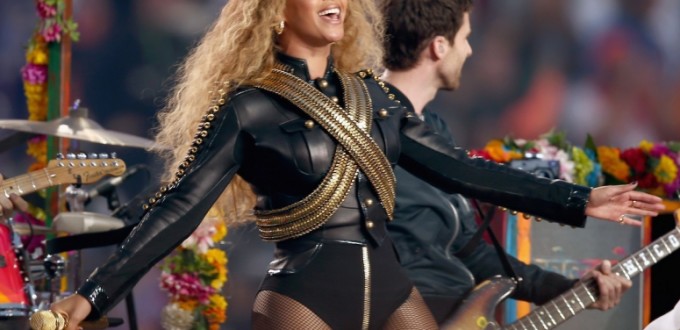
The day before her controversial Super Bowl performance, Beyoncé released her first single after a two-year hiatus. “Formation,” with an accompanying music video set in New Orleans, represents a new sound for Beyoncé, and it is seen as an unapologetically black anthem that has an upbeat, hip-hop sound originating from Houston, her hometown. Speaking to Beyoncé’s heritage and stereotypical physical attributes that black people have, the song addresses the ways in which the media tries to take away her identity. The name “Formation” is Beyoncé’s call for black women to stand up and participate in current social justice movements.
There are specific lyrics in the song that directly speak to her message. Tomiwa Sobande, ’17, a leader of the Black Student Alliance, believes that “Formation” is “a huge celebration of blackness, with lyrics like, ‘I like my baby heir with baby hair and afro/I like my Negro nose with Jackson Five nostrils,’ [which] really reminded [her] that no matter the world’s Eurocentric standards, [she is] beautiful.”
Kayla Bradshaw, 18, think that “Formation” and its music video are all about empowerment for the black community. Says Bradshaw, “I love the song and music video so much because of [their] beautiful representation of the many different kinds of people within the black community. To me, the song screams ‘I am black, I am proud of who I am, and you should be, too!’ […] an important reminder for the community especially because of all the recent events showcased in the media. ‘Formation,’ in my opinion, highlights black excellence and can be an anthem for black people everywhere.”
Ms. Beachler’s’ sister-in-law, Hannah Beachler, was the production designer for “Formation” and for Beyoncé’s upcoming music videos and agrees with Sobande’s and Bradshaw’s assertions. “Beyoncé just wanted to empower black women more than anything and the black community because she’s in solidarity. She been dealing with it for decades; she just hasn’t said anything about it because she just does it,” she says. “She employs a diverse group of people, but mostly women. She is a feminist in a way that would make you proud. She is a woman who is for women. She employs more women than probably anyone I know.”
The song has reached many people and has provoked different reactions. Kathryn Paravano, ’17, comments, “I interpret [“Formation”] as Beyoncé standing in solidarity with the Black Lives Matter movement and trying to push for reform in the justice system. I believe Beyoncé put her video out to send a message to higher authority: reform needs to happen. and it needs to happen now.”
Maddie Smith, ’16, whose family is from New Orleans and was displaced by Hurricane Katrina, takes issue with some of the imagery in the music video, saying, “The song ‘Formation’ is insulting and inaccurate. The video opens with inaccurate representations of the city of New Orleans. Beyoncé takes a serious issue, Hurricane Katrina, and abuses it by insulting the city and, specifically, the New Orleans police, on top of a police car that is [submerged] in water.”
The song’s lyrics make no actual references to the police; however, the music video features Black Lives Matter sentiments. There is a scene in which a young black boy wearing a black hoodie is dancing in front of a line of riot guards, representing Trayvon Martin. Then, similar to Michael Brown, he puts his hands up, and the police do also. Later, a wall shows the words “Stop shooting us.” Afterwards, Beyoncé is half submerged on a New Orleans police car in the water and she sinks with it at the end of the video.
Ms. Hannah Beachler was surprised at the negative reaction to the music video. “I didn’t expect people to lose it,” she says. “The New Orleans Police Department was well aware of what was happening. You can’t use their logo without asking; they had no problem with it. So why everyone else is getting so upset about it is beyond me.”
Others are upset by the imagery Beyoncé used at her Super Bowl performance: black female backup dancers, clad in black outfits and afros. They put up their fists in order to symbolize the Black Power Movement. Some, including Milwaukee County Sheriff David A. Clark Jr., were greatly offended by these outfits and movements. He told the Fox Business Channel that “Beyoncé coming out in those Black Panther-type uniforms–would that be acceptable if a white band came out in hoods and white sheets in the same sort of fashion? We would be appalled and outraged.” Calls to Sheriff Clark’s office for comment were not returned.
Bradshaw reacted differently, expressing her opinion that “the Black Panthers were not a black supremacist group. Therefore, if a group of white people went out in robes with hoods like the KKK, which was and still continues to be a white supremacist group, it certainly would not be equivalent to [Beyoncé and her dancers].”
Ms. Hannah Beachler puts both of these reactions into context by saying, “With the performance at the Super Bowl, I kind of giggled, because I don’t think people understand that most of it was largely a tribute to Janet Jackson and Michael Jackson with the Rhythm Nation outfits and afros to her military-inspired ensemble. People instantly jumped to other conclusions, saying that they were the new Black Panther Party, because they were wearing afros and berets. [Beyoncé] is the biggest Jackson fan on the face of this earth.”
Due to these images, there has been an uproar from various police unions and the public. A sheriff in Tennessee has gone so far as to blame Beyoncé and her performance for recent police shootings that have happened. Sheriff Robert Arnold said to The New York Times, “With everything that happened since the Super Bowl […] that’s what I’m thinking: here’s another target on law enforcement.” Calls to Sheriff Arnold’s office were not returned.
Bradshaw says, “I feel as though these police officers did not comprehend Beyoncé’s message. In ‘Formation,’ she is addressing the issue of police brutality, hence the sign ‘Stop shooting us,’ as seen in the music video. To me, this symbolizes that Beyoncé is calling for justice for the black community.”
Another student, Sofie Araya, ’17, comments, “The only thing that she was protesting [about] regarding the police was police brutality against the black community. Beyoncé was not protesting police forces as a whole.”
According to Ms. Hannah Beachler, Beyoncé’s intentions with the music video for “Formation” “all came down to Black Lives Matter. What is interesting is that the song is so separate from the images in the video. [The video] is all about the images. The lyrics do not mention anything about Black Lives Matter. There is no correlation between the words in the song and the images in the video. And the images were there because she wanted them to be. That’s why her ending line [explains that] conversation is exactly what she wanted. And they’re really not even the worst images. I don’t know why people are so bent out of shape about a kid dancing in front of cops or [the image] ‘Stop shooting us.’ You’re more upset about that than seeing Michael Brown’s body sitting out for an hour?”
She continues, “She’s getting to the point where she doesn’t care what people think; she is tired of doing the same thing. I think she decided to use her platform and talk about things that needed to be talked about, and she also wanted to clap back at her haters, as well. [For example], the fact that she can’t say what a man can say in a song. If [Formation’s lyrics] were coming out of Kendrick Lamar’s mouth, we wouldn’t be having this conversation. She’s expected to be pretty, and she’s expected to shut up, and she’s expected not to have a say about social culture or politics. I think a lot of it is that she’s a woman who has so much power and money. If anything, I don’t think it is about people necessarily being upset about her performance. In my opinion, they are upset about a strong black woman saying it. Because if it was someone else, there wouldn’t be this controversy. I fully believe that.”
Despite her fierce artistic persona, Beyoncé is apparently unassuming in person. Ms. Hannah Beachler says, “when [Beyoncé]’s not performing, she has a whole different persona. When she speaks, you can barely hear her talk–her voice is so soft. She is unapologetically herself, and it’s inspiring.” But don’t be fooled: “She is way smarter than anyone will ever give her credit for. She is a businesswoman first,” Ms. Hannah Beachler says. “‘Formation’ is the least of the controversy coming.”
